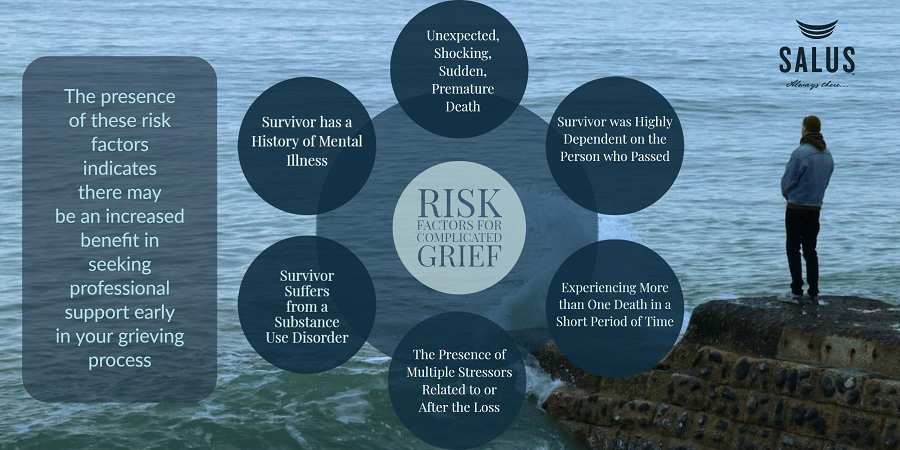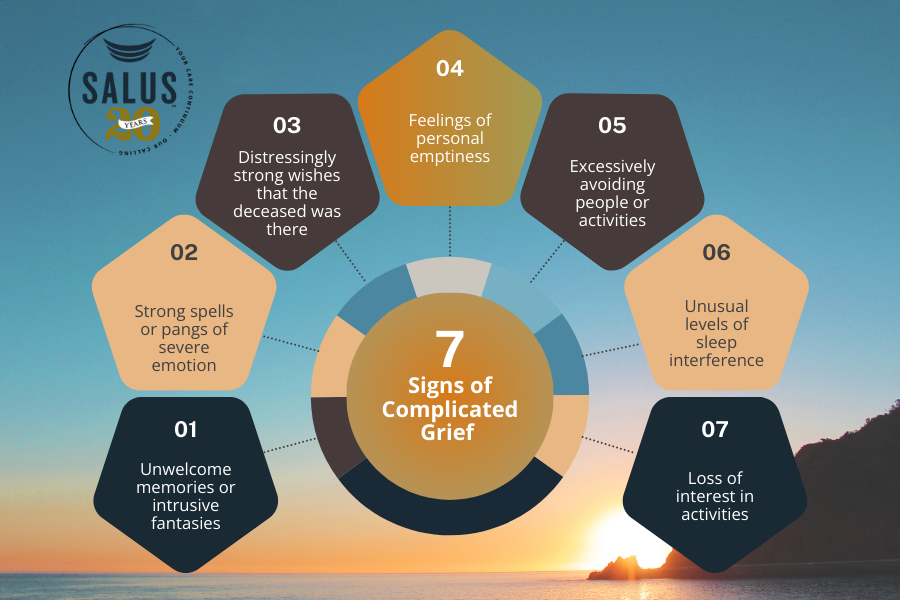
Social isolation and complicated grief are topics we seldom want to discuss, but they are important ones. While grief is a normal and natural part of mourning and bereavement, sometimes, grief doesn’t feel “normal” and can even seem “complicated.”
This is especially true when we experience a sudden loss. It can be difficult to process grief when loss is unexpected or feels like it is all-consuming.
What is Grief?
The Mayo Clinic describes grief as a strong, sometimes overwhelming emotion that is common after any loss – the loss of a loved one after a terminal diagnosis, ending a relationship, losing a job, losing some level of independence or even losing valued possessions.
Grief is both personal and universal. It is not one single emotion; rather, it is a state of being that you might walk through with moments of sadness, anxiety, anger or uncertainty.
Grief can also manifest in physical ways: tightening in the chest, a wrenching gut feeling, or lethargy and weakness.
Expert on grieving, psychiatrist Elisabeth Kubler-Ross breaks grief down into five stages: denial, anger, bargaining, depression and acceptance. While many people will cycle through all five stages of grief, it is not necessary for all five stages to be present for grieving to occur.
Remember that your journey through grief is unique, so there is no “normal” amount of time for each of these stages to last, and it’s not abnormal to skip a stage or cycle through the stages in an order that appears to be different from this list.
Grieving in Isolation
Because the grief journey is complex, humans are hard-wired to try to simplify it by defining it as “normal” or “abnormal.” The truth is, there are many different variations of “normal” grief. However, grief is often complicated when certain factors are out of our control.
In a time when self-isolation sometimes becomes the standard, it’s not “abnormal” to feel challenged when it comes to grieving healthily.
The added habit of isolating ourselves when we feel sad and limiting contact with the people who we would normally turn to for support may certainly restrict our ability to move through grief productively.
However, there are many simple yet effective tools for coping with loss more healthily.
Tips for Self-Care
- Practice Stress Management – Learn to use meditation techniques, mindfulness techniques or other ways of relaxation such as gardening, reading, or writing letters
- Connect with Friends and Loved Ones Through Phone Calls, Video Conferencing or Social Media – Technology can help you access needed support when you aren’t ready to meet face-to-face just yet
- Plan a Future Vacation or Event to Focus on Happier Days that Lie Ahead – Browse vacation pamphlets or online sites, consider your budget for a future trip, or discuss your pending plans with a loved one. Having something to look forward to sometimes helps ease the emotional and physical toll of grief.
- Find a Safe Space such as a Bereavement Support Group, your church community or a therapist’s office where you can vent, share your sadness, and find support.
- Learn a New Skill – Take up a hobby that you enjoyed in the past or find a new one.
- Find ways to Give Back by Volunteering – From senior centers to soup kitchens and animal rescues, there are plenty of places that could use your skills to help you find new people to connect with.
The Emotional and Physical Toll of Grief
Regardless of whether grief is normal or complicated, loss hurts, and grief is challenging for most people. As you walk through your grief experience, expect mixed feelings and even waves of anxiety, sadness, regret, or panic.
While these emotions can feel uncomfortable, it’s often reassuring to know that they are normal and experiencing them can help you cope and heal.
In addition to the emotional toll that grief takes, many people experience physical effects on the body. These might include headaches, stomach pains, exhaustion or the inability to focus.
While all can be normal parts of the grieving experience, it is important to take these symptoms seriously and reach out to your physician, especially if they last for a prolonged period of time or impact your overall health or day-to-day ability to function and maintain your independence.
What is Complicated Grief?
While there is no set timetable for grieving, nor is there one “right” way to grieve, some individuals may experience complicated grief, especially after a sudden loss or resulting from more uncertain times.
According to the Diagnostic and Statistical Manual of Mental Disorders (DSM-V), approximately 10% to 20% of bereaved persons have severe enough symptoms to be diagnosed with complicated grief.

While the signs and symptoms of complicated grief can look similar to those of normal grief in the initial months of the grieving process, what distinguishes complicated grief is its time period and how grief impacts a person.
Complicated grievers often bounce back and forth through the stages of grief without resolution. Their period of grief lingers and significantly impairs their ability to function.
Essentially, it is a heightened state of mourning or a fog of hopelessness that negatively impacts their ability to heal and one which feels impossible to lift out of.
Seven Signs of Complicated Grief

Within the last month, having experienced any three of the following seven symptoms with a severity that interferes with daily functioning is an indication that you may be experiencing complicated grief:
- Intrusive Symptoms
- Unwelcome memories or intrusive fantasies related to the lost relationship
- Strong spells or pangs of severe emotion related to the lost relationship
- Distressingly strong yearnings or wishes that the deceased was there
- Signs of Avoidance and Failure to Adapt
- Feelings of being far too alone or personally empty
- Excessively staying away from people, places, or activities that remind the subject of the deceased
- Unusual levels of sleep interference
- Loss of interest in work, social events, caretaking, or recreational activities to a maladaptive degree
Surviving Complicated Grief

Complicated grievers require immediate support from professional therapists, bereavement counselors, and sometimes psychiatrists to effectively heal through the grieving process.
Talk therapy, cognitive behavioral exposure therapy, and meaning-oriented therapies can help them to break through this cycle, alter their habits and face their loss in a healthy way.
For the most severe cases of grief, medications that treat the dopamine system are sometimes prescribed. These are often used in collaboration with bereavement therapy to support healing positively. The combination helps a person find their path forward.
In addition to seeking professional support, it is often helpful for the grieving individual to:
Talk Through It
- Don’t underestimate the power of talking through and allowing yourself to feel the true weight of your emotions. Think of this as an emotional release- as you talk, you vocalize your innermost feelings and let go of pain that is weighing you down.
- Sometimes it helps to hold an article of clothing that your loved one wore close and initiate a conversation with them – this exercise can bolster confidence, reduce anxiety and help you to find inner peace.
- Alternately, write letters. Later, when you’re ready, you can read these back to help identify your needs or burn them to release stuck feelings and signify a new beginning.
Seek Support
- Support is crucial to working through inner turmoil. Friends, family, your house of worship, or social support groups provide a safe space to voice concerns, share thoughts and express feelings.
- When seeking support, give yourself permission to express your emotions in your own way. Expressions of grief that might seem “messy” or overwhelming to someone else might be right for you. Keep in mind that it’s the other person’s job to listen and be there for you, and that’s just what anyone who cares about you will want to do.
Take Care of Yourself
- Listen to your inner voice and what it tells you you need. Remember that this is your personal journey, and as long as the choices you are making do not harm you or someone else, it’s okay to walk this path in your own way.
- Try to maintain a healthy diet and exercise routine. This can be challenging when you don’t feel like cooking or staying active, but even a short walk and a couple of healthy snacks per day can make a difference in your physical and emotional wellbeing.
Finding Solace

Truly the pain of losing someone may never fully go away, but with the passing of time and the right support, you can heal. Take action now to move forward in a healthy way after your loss.
Grant yourself patience and the ability to grieve in your own way, but also watch for signs of complicated grief and seek professional help if you need it. Remember that there is no certain timetable for grief. Take care of yourself throughout this process. Know that in time, things will get easier.

